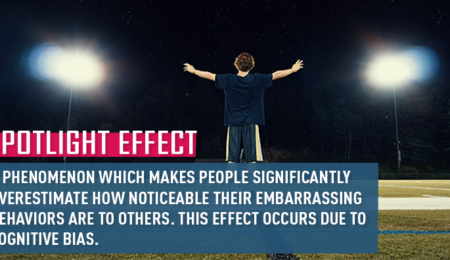10 Psychological Phenomena We Might have Experienced but Never Really Heard About

The human brain is the most fascinating and complex organ in the human body. It is still a mystery to neuroscientists who are keen to unravel the deep mysteries of this fascinating organ. Throughout the history of mankind, humans have experienced and replicated certain things termed as “psychological phenomena.”
These are defined as “brain tricks” that defy scientific explanation and remain a mystery to all. Here is a list of ten psychological phenomena we might have experienced but have never really heard about it before.
1 Phantom Vibration Syndrome: a perception in which one experiences their mobile phone vibrating or ringing when it is not ringing. A whopping 89% of people have experienced this syndrome.
Have you experienced your mobile phone ringing even when it is not ringing? This phenomenon is termed as “phantom vibration syndrome.”
According to a study by researcher Michelle Drouin, nine out of 10 undergraduate students at her college experienced these phantom vibrations. Research suggests that this syndrome arises due to over-involvement with one’s mobile phone.
The vibrations began to manifest themselves within a month after the person possesses a phone. It is suggested that the cerebral cortex confuses or misinterprets other sensory inputs such as muscle contractions, pressure, and other stimuli as phone vibrations or a ringtone.
These human signal-detection issues by the human brain are perceived as an influence of psychological attributes. The researchers have suggested that these vibrations will not cause any harm, but they can be stopped.
According to Rothberg’s survey, medical staff who possessed a pager or a mobile phone were successful in stopping the vibrations. They simply turned the device off from the vibration mode and instead used an audible ringtone.
Furthermore, they switched the location of the device and some even changed the device. These modifications produced a success rate of 75%, 63%, and 50% respectively. (1,2)Â
2 Event Boundary: occurs when we sometimes tend to forget what we needed when we enter a room because of a phenomenon called “event boundary.”

Each one of us has walked into a room only to realize we had forgotten why we are there in the first place. Notre Dame Scientist Gabriel Radvansky has spent close to two decades exploring why this phenomenon occurs.
He conducted an experiment by using three rooms to test participants’ ability to recall memories when they pass from one room to another. He was able to determine that passing through a door to a new room resulted in people forgetting what object they had just carried into the new room.
This underlying brain phenomenon has been attributed to an increased error rate in responding and termed as “event boundary.” It has been determined that the human brain segregates events and associate them to certain environments or a place where they occurred.
When a person moves from one room to the next, the brain works as a file that retrieves all information about the current room and the events that occurred in it.
When a person goes to another room, the focus shifts to the new, current room. The person has trouble recalling what they had intended to do in the now, current room making it hard for a person to recall the task thought of in the prior room.
You can overcome this phenomenon by mumbling the task as you move from one room to another. (source)
3 Spotlight Effect: a phenomenon that makes people significantly overestimate how noticeable their embarrassing behaviors are to others. This effect occurs due to cognitive bias.

Have you ever walked into a room and felt like everyone is watching and judging you? If you have felt that way, you have experienced the “spotlight effect.”
The spotlight effect is a cognitive bias in which an individual thinks they are being continuously observed, noticed, and judged by others. The term was coined and popularized by American psychologists Thomas Gilovich and Kenneth Savitsky.
According to experts, an anchoring-and-adjustment mechanism lays the foundation for the spotlight effect. The effect arises from being extremely self-conscious about what others may think.
The concerned individual suffers from “egocentric bias†which is a tendency to include other peoples’ viewpoints into their own thought process.
Other major factors that contribute to this effect are naïve realism and bias blind spot. This potent combination creates a situation where an individual uses their personal experiences and cognitions to evaluate others.
They also tend to overestimate the extent to which their perceptions are considered to be accurate and accepted by others. To overcome this effect, an individual can focus their attention on others rather than feeling conscious about themselves. (1,2)
4 Earworm: a phenomenon where a catchy piece of music continually repeats through a person’s mind after it is no longer playing.

Are you unable to get a song out of your head and end up singing it for hours on end? This phenomenon is termed “Involuntary Musical Imagery” or “earworms.”
Earworms are a common phenomenon and an example of spontaneous cognition. According to researchers, earworms are usually faster tunes with generic lyrics and catchy tunes.
Moreover, these songs can also be associated with a memory or characteristics that set them apart from others. These earworms are commonly triggered by experiences or involuntary memories.
According to research by James Kellaris, 98% of individuals experience earworms, with women experiencing it more often and longer than men.
The common example of earworms include “Bad Romanceâ€, “Alejandro,†and “Poker Face†by Lady Gaga, “Don’t Stop Believing†by Journey, “Can’t Get You Out Of My Head†by Kylie Minogue, “Bohemian Rhapsody†by Queen, and “California Gurls†by Katy Perry.
In 2015, research conducted by the School of Psychology and Clinical Language Sciences at the University of Reading in Pennsylvania demonstrated that chewing gum could help by blocking the sub-vocal rehearsal component of auditory short-term memory. (source)
5 Frequency Illusion aka Baader-Meinhof Phenomenon: the phenomenon in which people who have just learned or noticed something start seeing it everywhere.

Imagine having $35,000 to spare and you want to pamper yourself with a new ride from the hard-earned money. Suddenly, your colleague suggests you get a car model that you have never heard before. You showed a heightened interest in that car and start to encounter it everywhere. You are scared that you are imaging things, or is your mind playing tricks on you? According to experts, this phenomenon is called “Baader-Meinhof” or “frequency illusion.”
Baader-Meinhof is a phenomenon where one stumbles upon an obscure piece of information and happen to encounter it often and repeatedly. It is a term similar to “synchronicity” by invoking a feeling of mild surprise and the occurrence of selective attention.
This is a rare event having a one in 1,000 chance of happening. That means this event has a 0.1% likelihood chance of occurring. This makes it easier for a person to imagine themselves facing an unusual event.
The Baader-Meinhof is termed as a fantasy phenomenon whose uniqueness is diluted by science and facts. If you are hearing it for the first time, be on a lookout to see if you encounter this phenomenon repeatedly over the next few days. (source)
























